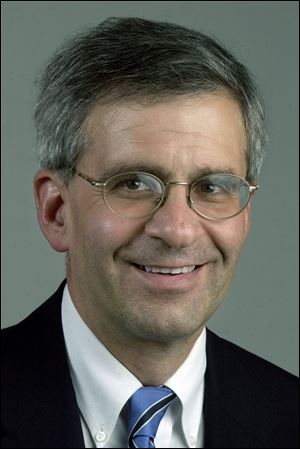
COMMENTARY
Our politics are stuck because our politicians are stuck in place
Congress and the President need to find a way to freshen the air and freshen their outlook
1/5/2014
David M. Shribman
A new year begins, and we are haunted by some of the old questions. But before Congress returns to the Capitol and before the White House creaks back into action, we might pause to examine the state of our politics.
This is an election year. The contours of the 2016 presidential campaign will begin to take form. Vital budgetary, military, and diplomatic questions will need to be confronted.
The year will open with a blast from the past, the memoir of former Defense Secretary Robert Gates. Because he served in the Pentagon under both a Republican and Democratic president, Mr. Gates ought not to be dismissed as a cranky geezer who is befuddled by memories of rosier days.
His book will salute George W. Bush and Barack Obama for their chivalry, but criticize many of their decisions. It also will excoriate Congress as “[u]ncivil, incompetent in fulfilling basic constitutional responsibilities (such as timely appropriations), micromanagerial, parochial, hypocritical, egotistical, thin-skinned, too often putting self (and re-election) before country. …”
That is a searing, but not a daring, assessment. A McClatchy-Marist Poll released last month showed the President and Congress with all-time low ratings. About two-thirds of the country view the nation as on the wrong track. So much for the glad tidings of the holiday season.
It may seem wearisome to read about governmental dysfunction and public disapproval, since they are such hardy perennials. Two generations of Americans have come to maturity with the conviction that government is bad, that politics is worse, that things are deteriorating at an ever-quickening pace, and that hope should be abandoned at the exit door of the maternity ward.
This is the legacy of Vietnam, the credibility gap, Watergate, the pardon of Richard Nixon, inflation, the Iran hostage crisis, Iran-contra, Whitewater, a presidential impeachment, terrorism, financial collapse, congressional paralysis, and much more.
But each presidential administration, and each new Congress, has the chance to start anew. There have been moments of great hope in the past third of a century.
They came on the right with the election of Ronald Reagan and on the left with the elections of Bill Clinton and Barack Obama. These were times when young people and even wizened old veterans longed to be in Washington, to breathe the new fresh air and to shape the new fresh outlook.
We do not have such opportunities in 2014, but Congress and the President need to find a way to freshen the air and freshen their outlook. The country simply cannot continue the “decay in the quality of American government,” as political theorist Francis Fukyuama puts it.
The prospects for revival-tent conversion are dim. In a widely discussed essay published last month, Mr. Fukuyama took aim at the role of interest groups in American politics, with a swipe at Congress.
This part of his critique is especially worth examining:
“It is commonly and accurately observed that no one in the U.S. Congress really deliberates anymore. Congressional ‘debate’ amounts to a series of talking points aimed not at colleagues but at activist audiences, who are perfectly happy to punish a legislator who deviates from their agenda as a result of deliberation or the acquisition of greater knowledge. This leads then to bureaucratic mandates written by interest groups that restrict bureaucratic autonomy.”
Embedded in that one paragraph are several great truths. The Senate, which describes itself as the world’s greatest deliberative body, is no such thing.
Politicians’ views are shaped for, and shaped by, special-interest groups. Ideological rigidity and foolish consistency are celebrated rather than deplored.
Maybe what America needs is a little less consistency from its politicians. Start with the notion of making congressional debates and White House negotiations actual debates and actual negotiations.
Perhaps the presence of so many lawyers and the lure of the closing argument has warped our politics. But if politicians viewed their scripted talking points only as opening arguments rather than as the last word, if they listened to the views of their rivals, and if they then evaluated their views against their opponents’, they might find a middle ground, or at least learn to respect views that clash with theirs, and the men and women who express them.
Our politicians believe that the speech — and the negotiation, or the House-Senate conference committee — is less for persuasion than for exposition. Let’s consider celebrating the politician who changes his or her mind — not for mean advantage, but for principle.
It’s time to heed the wisdom of science-fiction writer Isaac Asimov: “Your assumptions are your windows on the world. Scrub them off every once in a while, or the light won’t come in.”
So let’s scrub the windows of our politics. Let’s not abandon our principles. Instead, let’s consider whether we might abandon our positions, especially if they were furnished on memos prepared by the special interest groups that govern our politics — or if they were conjured by politicians who hope to appeal to those interests.
Politicians: Heal thyselves. Politicians: Think for thyselves.
David Shribman is executive editor of the Pittsburgh Post-Gazette.
Contact him at: dshribman@post-gazette.com